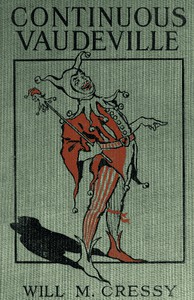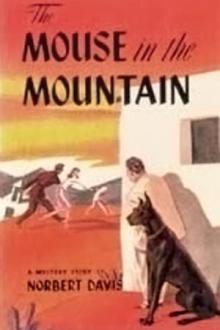Continuous Vaudeville, Will M. Cressy [top 10 inspirational books TXT] 📗

- Author: Will M. Cressy
Book online «Continuous Vaudeville, Will M. Cressy [top 10 inspirational books TXT] 📗». Author Will M. Cressy
"Lay over!"
Lehman groaned, got one look at the female, then placed both feet in the small of her back and shot her out on to the floor, yelling loudly for the police.
[35]The car was in an uproar in an instant. Lehman was lying on his back, shouting "Police!" The female was screaming and hunting for her teeth. The conductor, the porter and the brakeman came running in to see whether it was a political discussion or just a murder. All the old lady could do was to mumble and hunt for her teeth. A man across the aisle swore that he saw Lehman stab the old lady with a bowie knife and throw her out into the aisle. The woman with the baby corroborated him, excepting that she thought he hit her with a piece of lead pipe.
By this time the old lady had found part of her Fletcherizing outfit and informed the congregation that she was neither struck nor stabbed; but that her husband in the berth there had certainly gone crazy.
There was a sympathetic chorus of "Oh!s" from the other passengers and the conductor jerked the curtains aside and asked Lehman what he meant by treating his wife this way.
"My wife?" screamed Lehman. "Why you —— —!$!—&—$&'o$—! Are you calling that old goat face my wife?"
"Sure that's your wife! Don't you suppose she knows?"
[36]"Well, don't you suppose I know! Do I look as if I would be the husband of anything that looks like that?"
The old lady now caught sight of Lehman for the first time.
"Why," she gasped; "that isn't my husband."
"I know darn well it ain't," said Lehman.
"Then what are you doing in my berth?" demanded the old lady.
"I am not in your berth!"
"You are in my berth!"
"Let's see your tickets," said the conductor.
"Here is mine," said the old lady. "Lower seven."
"And here is mine," said Lehman. "Lower seven."
The conductor looked at them closely; then stepped back under a lamp and looked at them closer. Then he handed the old lady's back to her. Then he turned to Lehman and, handing him his ticket, said,
"That is your yesterday's ticket from Kansas City to Chicago." Lehman looked at it dazed for a moment, then dressed and went up into the baggage car where he sat on a trunk all the way to New York.
[37]
E. M. Chase, a Norfolk (Va.) newspaper man, has for years been collecting newspaper clippings. The following are from some of his rural exchanges:
"The funeral was conducted at the home by the Rev. Mr. Browles and was afterwards buried in the old family burying ground."—Lebanon (Va.) News.
"Mrs. W. G. Neighbors is suffering with a rising corn on her foot."—Lebanon News.
"J. N. and Alfred Quillen were grafting in our neighborhood a few days last week."—Gate City Herald.
"Rev. W. C. Hoover preached an excellent sermon at the Union Chapel on last Sunday, his subject being entitled, 'I go to prepare a place for you.' Rev. Hoover and family then spent the rest of the day with Mr. Luther Armentrout and family."—Shenendore Valley Newmarket.
"The members of Moore's Store String Band met Saturday evening and rendered some very fine music, as follows: W. E. Lloyd, H. E. Weatherholtz, V. M. Weatherholtz, B. H. Golliday, C. S. Moore and 26 spectators."—Shenendore Valley Newmarket.
"Selone Sours is out after a severe cold.
[38]"Her daughter Emma Sours is still nursing her risings.
"Your scribe took a trip to Louray one day last week and purchased three sacks of fertilizer, one peck of clover seed and a half bushel of timothy seed.
"We remarked to our little son the other day that it was going to rain, as certain birds were singing, and he said, 'Pa, rain don't come out of a bird.'"—The Page News.
There is a sign over in Newark that somehow doesn't just strike my fancy; it reads—
P. Flem. Delicatessen.
A couple of young country chaps wandered into the lobby of Shea's Theater in Toronto and stood watching the people go up to the ticket-office window and purchase tickets; finally they got into the line, worked their way up to the window, then one of them laid down a two-dollar bill and said,
"Give me two tickets to Hamilton, Ontario."
"Irish Billie Carrol" was standing in the wings at the old Olympic Theater in Chicago, watching[39] the show. There was a chap on who was one of those men who can never let well enough alone; if he said or did anything that the audience laughed at, he would immediately say or do it right over again. Billie watched him awhile, then turned to his friend and said,
"All the trouble with him is, he always takes three bases on a single."
Barney Reiley, then with the Old Homestead Company, now the manager of a theater in Indianapolis, and I were walking down the street in Baltimore, when the sun, shining through a magnifying glass, set fire to an oculist's show window.
"By Golly," said Barney, "it's a lucky thing that didn't happen in the night, when there was nobody around."
Boston newspapers one week contained the following interesting announcement:
"At Keith's; Cressy and Dayne; Don't fail to bring the children to see the Trained Dogs."
[40]

At the Majestic Theater in Chicago they have a big, two-sided, electric sign upon which are displayed the names of the acts playing there. They place the names of two acts on each side and use no periods. One week the two sides read—
"CRESSY & DAYNE THE VAGRANTS."
and
"ELBERT HUBBARD NIGHT BIRDS."
"Want to see 'The Billboard,' Mister?"
Said the Landlord to the Actress,
"I'd rather see the board bill, Sister."
[41]

An English actor, just over, was playing at the Fifth Avenue Theater in New York City. He was in love with America and wanted to see it all—quick. One night he came to me and said,
"I think I will take a run over to Buffalo Bill's place in the morning, before the matinée."
I told him I would; it would be a good run for him.
Buffalo Bill lives in North Platte, Nebraska.
One of the provincial music halls in England has the roof arranged like a roll-top desk, so that in hot weather it can be rolled back, thus making a sort of roof garden out of it. An American Song and Dance Team was making their first European appearance there; their act was a much[42] bigger hit than they had anticipated; and when they came off at the end of their act one of them said delightedly to the other,
"Say, we just kicked the roof off of them, didn't we?"
"I beg pawdon, old chap," said the stage manager, overhearing him; "it rolls off, you know."
James Thornton and Fred Hallen were coming out of the Haymarket Theater in Chicago; Jim, who was ahead, let the door slam back against Fred.
"Oh, Good Lord," howled Fred, hanging on to his elbow; "right on the funny bone."
Jim looked at him, and in that ministerial way of his said,
"You haven't a funny bone in your body."
A young man asked me recently what spelled success on the stage. I told him the only way I had ever found of spelling it was W-O-R-K.
[43]
SOME HOTEL WHYSWhy are porters and bellboys always so much more anxious to help you out than in?
Why do so many hotel bathrooms have warm cold water and cold hot water?
Why is it that on the morning you are expecting company you can never find the chambermaid? And every other morning she tries your door every fifteen minutes regularly.
Why does a hotel clerk always try to give you some room different from the one you ask for?
Why does a hotel cashier always look at you pityingly?
Why does a bellboy always try to get two quarts of water into a quart pitcher?
Why do hotels feed actors cheaper than they do folks?
Why is a mistake in the bill always in the hotel's favor?
Why does the landlord's wife always have theatrical trunks?
[44]Why do drummers always leave their doors open?
Why does my wife always try to get a corner table, and then put me in the chair facing the wall?
Why do "American" hotels always have French and Italian cooks?
Why does the fellow in the next room always get up earlier than I do?
Why does the elevator boy always go clear to the top floor and back when the man on the second floor rings for him?
Why is the news stand girl always so haughty?
Why does the night clerk always dress so much better than the day clerks?
Why do I think I know so much about running a hotel?
[45]
IT ISN'T THE COAT THAT MAKES THE MANA seedy-looking chap came up to Roy Barnes in Toronto and said in an ingratiating way:
"I don't know as you will remember me, Mr. Barnes, but I met you down at Coney Island last summer."
"Yes, sure, I remember you easy," said Barnes, grasping his hand in both his own. "I remember that overcoat you have on."
"I hardly think so," said the seedy party, trying to draw his hand away; "I did not own this overcoat then."
"No," said Barnes, "I know you didn't; but I did."
Grace Hazard has a washlady. Washlady has a thirteen-year-old son. Son became infected with the acting germ and ran away to go with Gertrude Hoffman's Company. His mother was telling Miss Hazard about it.
[46]"'Deed, Mis' Hazard, yo' know 'tain't right for dat po' li'le innocent child to be pesterin' roun' dem theater houses dat er way. 'Twas jes' dis ver' mo'nin' dat he's Sunday-school teacher wuz sayin' to me: 'Dat boy has got too much—too much—intelligence to be in dat stage bus'ness nohow.'"
Hanging in each room of the Great Southern Hotel at Gulfport, Miss., is a small sign stating—
ON THEIR FLOOR BY APPLYING
TO THE MAID ON THEIR FLOOR.
A friend of mine in St. Louis is a Police Captain. One day he went into a bank to get a check cashed. He was in citizen's clothes and the paying teller did not know him anyway; so he said,
"You will have to be identified, sir. Do you know anybody here in the bank?"
"I presume so," said the Captain cheerfully; "line 'em up and I'll look 'em over."
[47]Seen from the car window: "Shuttz Hotel. Now open."
On Elmwood Avenue, Buffalo: "Organs and Sewing Machines tuned and repaired."
At the St. James Hotel, Philadelphia:
Mrs. Cressy. "Waiter, have you any snails today?"
Waiter. "No, mam."
Mrs. C. "What's the matter? Can't you catch them over here?"
[48]
ONE-NIGHT-STAND ORCHESTRASMy idea of what not to be is Musical Director of a Musical Comedy playing one-night stands. This is the real thing in the Trouble line.
Max Faetkenheuer was musical director with an opera company that was playing through the South. They arrived in one town at four in the afternoon, and Max found the orchestra waiting at the theater. They looked doubtful; they sounded dreadful. Individually they were bad; collectively they were worse. During the first number the cornet only struck the right note once and that frightened him so he stopped playing. The clarinet player had been taking lessons from a banjo teacher for three years and had never made the same noise twice. There were six French horns, all Dutch. The trap drummer was blind and played by guess and by gorry.
Max labored and perspired and swore until 7:15; then he had to stop because the audience[49] wanted to come in and didn't dare to while the riot was on.
"Now look, Mister Cornet Player," Max said; "I'll tell you what you do; you keep your mute in all through the show."
"Yes, well,





Comments (0)